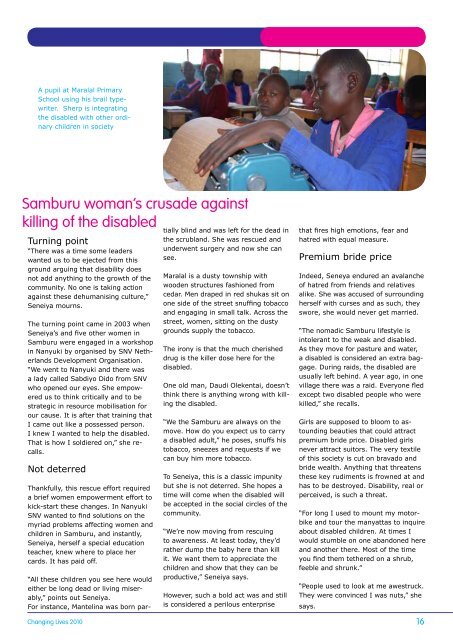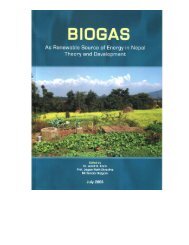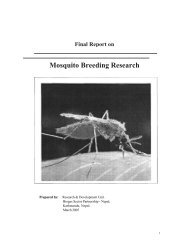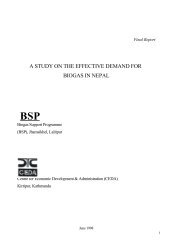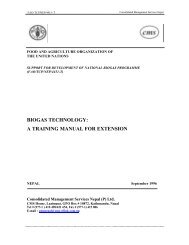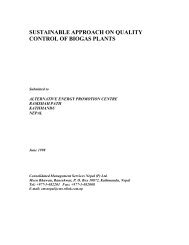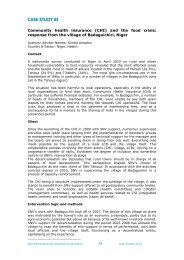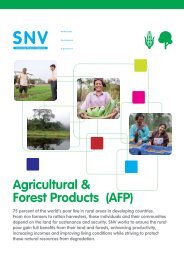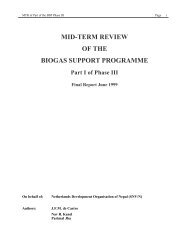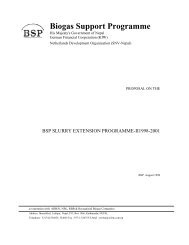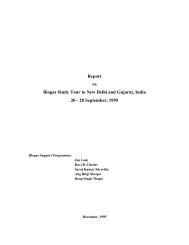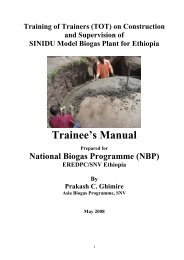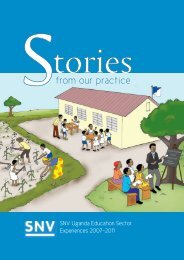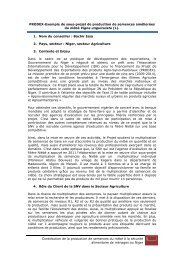ways that changed communities - SNV
ways that changed communities - SNV
ways that changed communities - SNV
Create successful ePaper yourself
Turn your PDF publications into a flip-book with our unique Google optimized e-Paper software.
A pupil at Maralal Primary<br />
School using his brail typewriter.<br />
Sherp is integrating<br />
the disabled with other ordinary<br />
children in society<br />
Samburu woman’s crusade against<br />
killing of the disabled<br />
Turning point<br />
“There was a time some leaders<br />
wanted us to be ejected from this<br />
ground arguing <strong>that</strong> disability does<br />
not add anything to the growth of the<br />
community. No one is taking action<br />
against these dehumanising culture,”<br />
Seneiya mourns.<br />
The turning point came in 2003 when<br />
Seneiya’s and five other women in<br />
Samburu were engaged in a workshop<br />
in Nanyuki by organised by <strong>SNV</strong> Netherlands<br />
Development Organisation.<br />
“We went to Nanyuki and there was<br />
a lady called Sabdiyo Dido from <strong>SNV</strong><br />
who opened our eyes. She empowered<br />
us to think critically and to be<br />
strategic in resource mobilisation for<br />
our cause. It is after <strong>that</strong> training <strong>that</strong><br />
I came out like a possessed person.<br />
I knew I wanted to help the disabled.<br />
That is how I soldiered on,” she recalls.<br />
Not deterred<br />
Thankfully, this rescue effort required<br />
a brief women empowerment effort to<br />
kick-start these changes. In Nanyuki<br />
<strong>SNV</strong> wanted to find solutions on the<br />
myriad problems affecting women and<br />
children in Samburu, and instantly,<br />
Seneiya, herself a special education<br />
teacher, knew where to place her<br />
cards. It has paid off.<br />
“All these children you see here would<br />
either be long dead or living miserably,”<br />
points out Seneiya.<br />
For instance, Mantelina was born partially<br />
blind and was left for the dead in<br />
the scrubland. She was rescued and<br />
underwent surgery and now she can<br />
see.<br />
Maralal is a dusty township with<br />
wooden structures fashioned from<br />
cedar. Men draped in red shukas sit on<br />
one side of the street snuffing tobacco<br />
and engaging in small talk. Across the<br />
street, women, sitting on the dusty<br />
grounds supply the tobacco.<br />
The irony is <strong>that</strong> the much cherished<br />
drug is the killer dose here for the<br />
disabled.<br />
One old man, Daudi Olekentai, doesn’t<br />
think there is anything wrong with killing<br />
the disabled.<br />
“We the Samburu are al<strong>ways</strong> on the<br />
move. How do you expect us to carry<br />
a disabled adult,” he poses, snuffs his<br />
tobacco, sneezes and requests if we<br />
can buy him more tobacco.<br />
To Seneiya, this is a classic impunity<br />
but she is not deterred. She hopes a<br />
time will come when the disabled will<br />
be accepted in the social circles of the<br />
community.<br />
“We’re now moving from rescuing<br />
to awareness. At least today, they’d<br />
rather dump the baby here than kill<br />
it. We want them to appreciate the<br />
children and show <strong>that</strong> they can be<br />
productive,” Seneiya says.<br />
However, such a bold act was and still<br />
is considered a perilous enterprise<br />
<strong>that</strong> fires high emotions, fear and<br />
hatred with equal measure.<br />
Premium bride price<br />
Indeed, Seneya endured an avalanche<br />
of hatred from friends and relatives<br />
alike. She was accused of surrounding<br />
herself with curses and as such, they<br />
swore, she would never get married.<br />
“The nomadic Samburu lifestyle is<br />
intolerant to the weak and disabled.<br />
As they move for pasture and water,<br />
a disabled is considered an extra baggage.<br />
During raids, the disabled are<br />
usually left behind. A year ago, in one<br />
village there was a raid. Everyone fled<br />
except two disabled people who were<br />
killed,” she recalls.<br />
Girls are supposed to bloom to astounding<br />
beauties <strong>that</strong> could attract<br />
premium bride price. Disabled girls<br />
never attract suitors. The very textile<br />
of this society is cut on bravado and<br />
bride wealth. Anything <strong>that</strong> threatens<br />
these key rudiments is frowned at and<br />
has to be destroyed. Disability, real or<br />
perceived, is such a threat.<br />
“For long I used to mount my motorbike<br />
and tour the manyattas to inquire<br />
about disabled children. At times I<br />
would stumble on one abandoned here<br />
and another there. Most of the time<br />
you find them tethered on a shrub,<br />
feeble and shrunk.”<br />
“People used to look at me awestruck.<br />
They were convinced I was nuts,” she<br />
says.<br />
Changing Lives 2010 16


